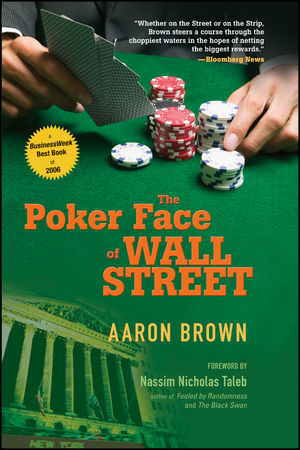Certain trading firms (i.e. Susquehanna International Group) believe playing poker can help a trader better perform in the market. What is the rationale behind this? How exactly does playing a card game improve equity and options trading performance?
-
$\begingroup$ I've found astonishing parallels between poker and trading. Poker will teach you how to gradually increase your bet based on your expected EV as cards being dealt (fading into a trading position as market moves), when to take a loss and get out (puking a trading position), and when to go all in with your chips (maxing out your risk on a trade, good luck). $\endgroup$– A1122Commented Jun 7, 2017 at 6:36
-
$\begingroup$ @A1122 Increasing your bet as you get better cards in poker is about not scaring our your opponents though, what parallel does this have with trading? And likewise with bluffing? $\endgroup$– willCommented Jun 7, 2017 at 6:45
-
$\begingroup$ @will These could have a parallel in the realm of HFT. With quote stuffing similar to bluff and optimal order placement (e.g. execution algortihms that break huge orders into chunk to dampen market impact) similar to not scaring your opponents. $\endgroup$– QuantupleCommented Jun 7, 2017 at 7:06
-
$\begingroup$ @quantuple yeah that makes sense. But if we're going to include market manipulation, why not include phoning around and letting then know you have a great hand, à la Gordon Gecko? $\endgroup$– willCommented Jun 7, 2017 at 7:09
-
2$\begingroup$ Imho it proves that they have an understanding of probability and behavioural aspects. And thats at least something you should have so its a plus. But there's nothing that says a good poker player is a good trader. By the way, a trader these days usually does not "beat" a market but tries to make a market... $\endgroup$– vanguard2kCommented Jun 8, 2017 at 8:03
2 Answers
This pic and many more interesting insights about the connection can be found here:
https://www.quora.com/Why-do-trading-firms-recruit-poker-players
-
4$\begingroup$ Thanks for a nice presentation slide, but I can't refrain from noting, that it is highly biased. The fact that you can pick 3-4 highly successful traders with poker background doesn't really mean anything. $\endgroup$– LazyCatCommented Jun 7, 2017 at 15:43
-
2$\begingroup$ @LazyCat: I agree but the points mentioned below those examples are worth considering in my opinion. $\endgroup$– vonjdCommented Jun 7, 2017 at 15:45
-
2
To answer this question Aaron Brown wrote a book. With a foreword by Nassim Taleb. In Taleb's words:
The revelation was that poker differs greatly from the random walk-hence, one could learn from it; furthermore, it may be the sole venue for us to learn about randomness. How? Simply, it has other hidden higher layers of uncertainty-many of them. It has suckers, people who invite you to take advantage of them. It also has people for whom you are the sucker (of course, without your being aware of it). You are not flipping a coin and moving left or right. You are not betting against a large machine like a roulette wheel. You are not engaging in a blind draw. You are playing against other humans. You cannot easily control their maximum bet. Your betting policy matters far more than the probability of getting a given card. You can bluff your way, confuse other players, win in spite of a bad hand, or lose in spite of an unlikely good one. Not least, bets can escalate.
The above could be said about trading ...
Here is the link.
Aaron Brown used to be an executive director at Morgan Stanley and a serious lifelong poker player who has played with Wall Street tycoons and world champion poker pros.
-
$\begingroup$ Did Aaron leave AQR to go back to ms? $\endgroup$ Commented Jun 9, 2017 at 18:02
-
$\begingroup$ @FinanceGuyThatCantCode As much as I know - no. I corrected the answer $\endgroup$ Commented Jun 9, 2017 at 18:33


